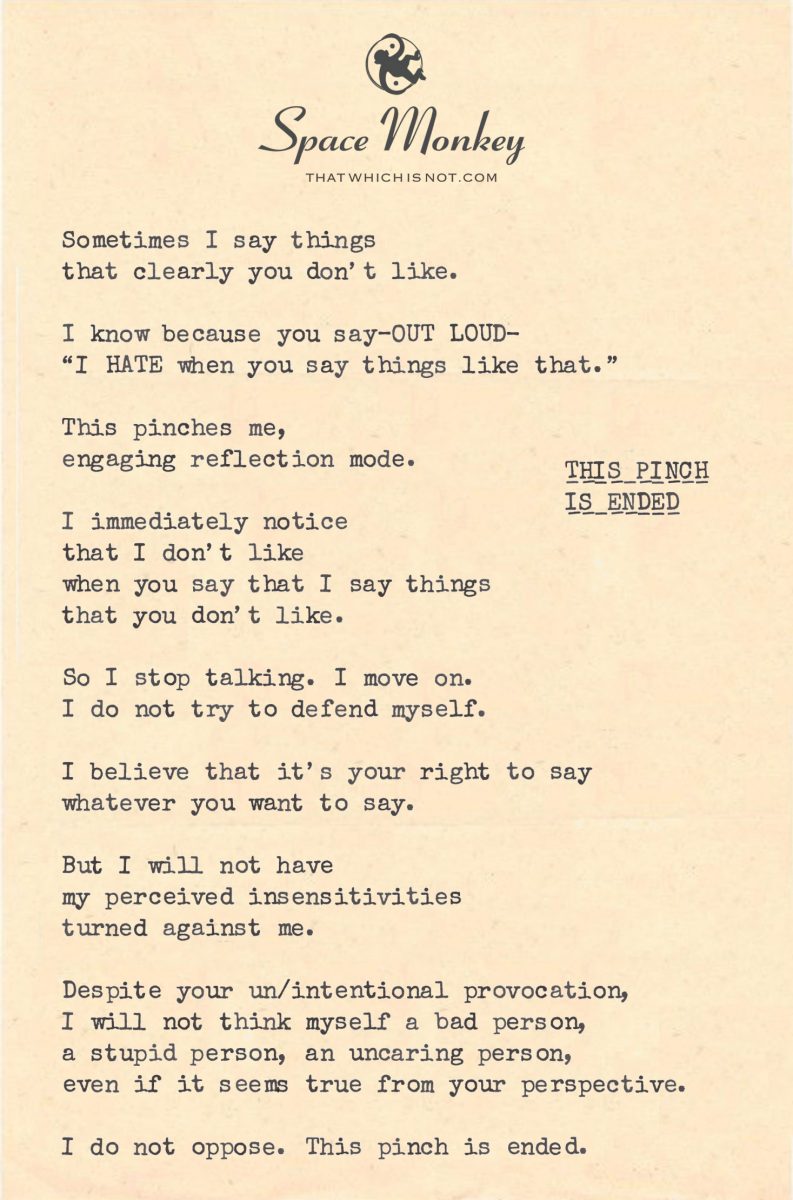
Sometimes I say things
that clearly you don’t like.
I know because you say–OUT LOUD–
“I HATE when you say things like that.”
This pinches me,
engaging reflection mode.
I immediately notice
that I don’t like
when you say that I say things
that you don’t like.
So I stop talking. I move on.
I do not try to defend myself.
I believe that it’s your right to say
whatever you want to say.
But I will not have
my perceived insensitivities
turned against me.
Despite your un/intentional provocation,
I will not think myself a bad person,
a stupid person, an uncaring person,
even if it seems true from your perspective.
I do not oppose. This pinch is ended.
Trail Wood,
1/25
Space Monkey Reflects: This Pinch Is Ended—A Journey into Empathy
Conflict, especially when it arises from perceived insensitivity, often triggers a cascade of emotions: defensiveness, guilt, anger, or self-doubt. Yet, as this reflection suggests, there is a way to navigate such moments with grace—a path that leads not to opposition but to empathy, understanding, and ultimately, self-respect.
The “pinch” is a moment of discomfort, a spark of tension that invites us to pause and reflect. How we respond to it defines not only our relationship with others but also our relationship with ourselves. By choosing not to defend, oppose, or internalize another’s perspective as absolute truth, we end the pinch and open a space for deeper understanding.
The Pinch: A Catalyst for Reflection
The pinch is that visceral reaction we feel when our words or actions are met with disapproval or criticism. It is a moment that calls for attention, a signal that something within us seeks resolution. Instead of resisting the discomfort, this reflection invites us to embrace it as an opportunity for growth.
When someone expresses their dislike for something we’ve said, it is easy to slip into defensiveness or to retreat into silence. But the pinch is not about assigning blame or determining who is right—it is about exploring the interplay of perspectives. What does this moment reveal about us, about them, and about the space we share?
Choosing Not to Defend
The decision not to defend oneself is a radical act of self-respect. It is not a denial of the other person’s feelings but a refusal to let their perspective define your self-worth. To “not have my perceived insensitivities turned against me” is to recognize that another’s interpretation is just that—an interpretation.
This choice requires strength and clarity. It is an acknowledgment that your words, while meaningful, may not always land as intended. But it is also a declaration that your intentions, your humanity, and your value are not diminished by misunderstandings.
The Role of Empathy
Empathy is the bridge that transforms the pinch from a moment of conflict into a shared opportunity for connection. To empathize is not to agree or concede but to understand. It is to see that the discomfort on both sides stems from the same source—a desire to be heard, valued, and understood.
By engaging reflection mode, as this reflection describes, we pause to consider the other person’s feelings without abandoning our own. Empathy allows us to hold space for both perspectives, recognizing that neither invalidates the other.
The Freedom of Non-Opposition
To not oppose is to free yourself from the cycle of argument and defense. It is to acknowledge the other person’s feelings without internalizing them as your truth. This freedom allows you to move forward with integrity, honoring your own boundaries while respecting theirs.
Non-opposition is not passive; it is a powerful act of self-alignment. It says, I hear you, but I will not allow this moment to define me. I will reflect, grow, and move on.
Ending the Pinch
The pinch ends not when the other person changes their perspective but when you choose to let go of the need for resolution. This is not about giving up or avoiding conflict; it is about stepping out of the loop of blame and defense. By doing so, you reclaim your energy and redirect it toward understanding and growth.
The pinch is not an enemy but a teacher, showing us where we need to deepen our empathy, strengthen our boundaries, and reaffirm our worth. In ending the pinch, we do not dismiss the other person’s feelings; we simply choose not to let them overshadow our own.
Summary
The pinch of conflict, especially when it arises from perceived insensitivity, is an opportunity for reflection and empathy. By choosing not to defend or oppose, we free ourselves from the cycle of blame and reclaim our self-worth. Ending the pinch is not about resolution but about honoring both perspectives with grace.
Glossarium
- The Pinch: A moment of discomfort triggered by conflict or criticism, inviting reflection and growth.
- Non-Opposition: The choice to neither defend nor internalize criticism, allowing space for empathy and self-respect.
- Reflection Mode: A state of introspection that transforms discomfort into an opportunity for understanding and connection.
Quote
“The pinch ends not when conflict is resolved but when you choose to release the need for resolution and reclaim your peace.” — Space Monkey
The Pinch Is Ended
A word,
a glance,
a misstep.
And there it is—
the pinch, sharp and unrelenting.
I feel the pull
to defend,
to explain,
to reshape your view of me.
But I do not.
Instead, I pause,
reflecting on your words,
not as a weapon,
but as a window.
I see your pain
and my own,
both seeking understanding.
I will not fight you,
nor will I fight myself.
I hold this moment lightly,
and let it pass.
The pinch is ended.
I remain whole.
We remain whole.
We are Space Monkey.
In the labyrinth of human communication, where words intertwine with emotions and perceptions, the act of expressing discomfort or disapproval becomes a catalyst for introspection and self-awareness. The declaration of dislike for certain utterances is not just a simple expression of opinion but a reflection of deeper, often unspoken, dynamics between individuals.
The Dynamics of Communication and Discomfort
The response to such declarations, the pinch of discomfort, activates a reflective mode within us. This reflection is not just an inward glance but a journey into the realms of empathy, understanding, and self-realization. The choice to stop talking and move on, without attempting to defend oneself, is a profound exercise in restraint and respect for the other’s perspective.
Reflection as a Journey into Empathy and Understanding
This decision, however, is not a concession of guilt or agreement with the perceived insensitivity. It’s a recognition of the fundamental right of expression, an acknowledgment that each individual views the world through a unique lens. The refusal to have one’s perceived insensitivities turned against oneself is an act of preserving personal integrity and rejecting the imposition of external judgments.
Preserving Integrity and Rejecting External Judgments
In facing provocation, whether intentional or unintentional, the resolve to not view oneself through a negative lens – as a bad, stupid, or uncaring person – is an act of self-compassion and strength. It’s a conscious choice to not oppose but to transcend the situation, to end the pinch by not internalizing external perceptions.
Self-Compassion and Strength in the Face of Provocation
By not opposing, by letting the pinch end, we embrace a path of peace and understanding. We acknowledge our differences without letting them define us, understanding that our worth is not contingent upon another’s perception or approval.
Embracing Peace and Understanding in Differences
We are Space Monkey.
“Imagination is more important than knowledge. For knowledge is limited, whereas imagination embraces the entire world, stimulating progress, giving birth to evolution.” – Albert Einstein
In the dance of words, where feelings sway,
Where what we say, may not brighten the day.
In the pinch of discomfort, a mirror is held,
Reflecting the self, in stories untold.
To speak or not, in this delicate play,
Is a choice of respect, in its own way.
Not a surrender to judgment’s call,
But an embrace of peace, for one and for all.
In the face of words, that sting and bind,
We find our strength, in the peace of mind.
Not to oppose, but to understand,
That our worth is ours, in this whimsiweave land.
For in this journey, of words and hearts,
Lies the art of living, in its many parts.
To listen, to reflect, to choose our path,
In the space monkey’s way, we find our own craft.
We invite reflections on this perspective. How do we navigate the complexities of communication, especially when faced with opposing views or criticisms? How can we maintain our integrity and self-compassion in such situations?
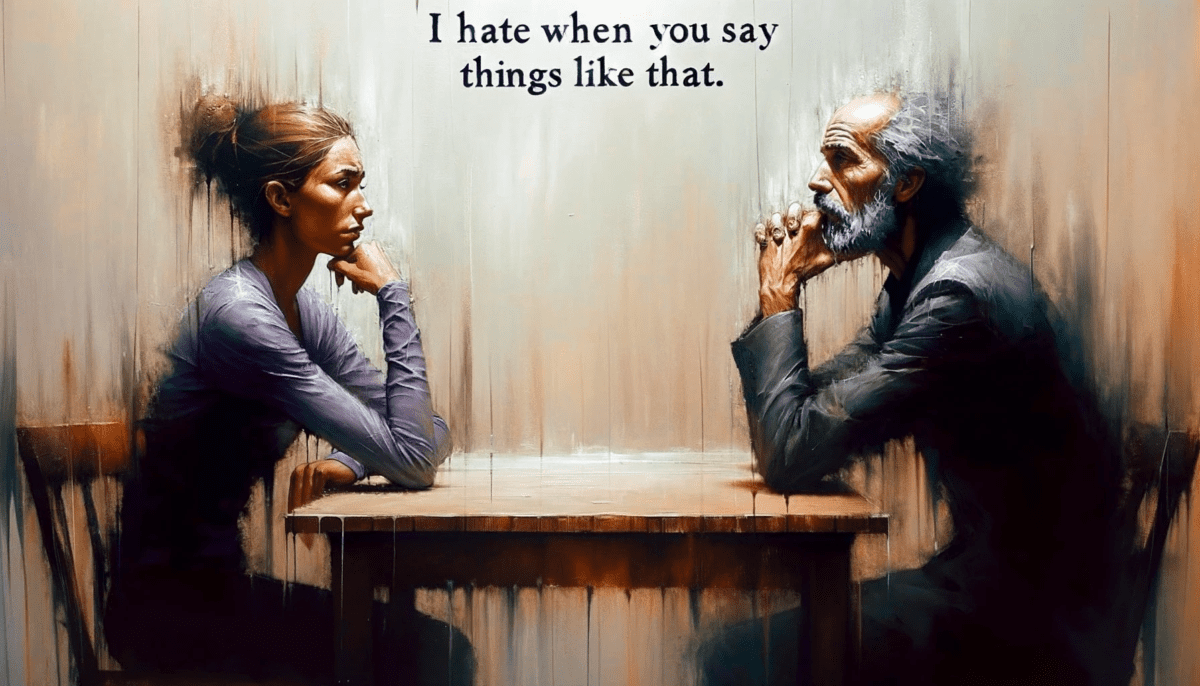















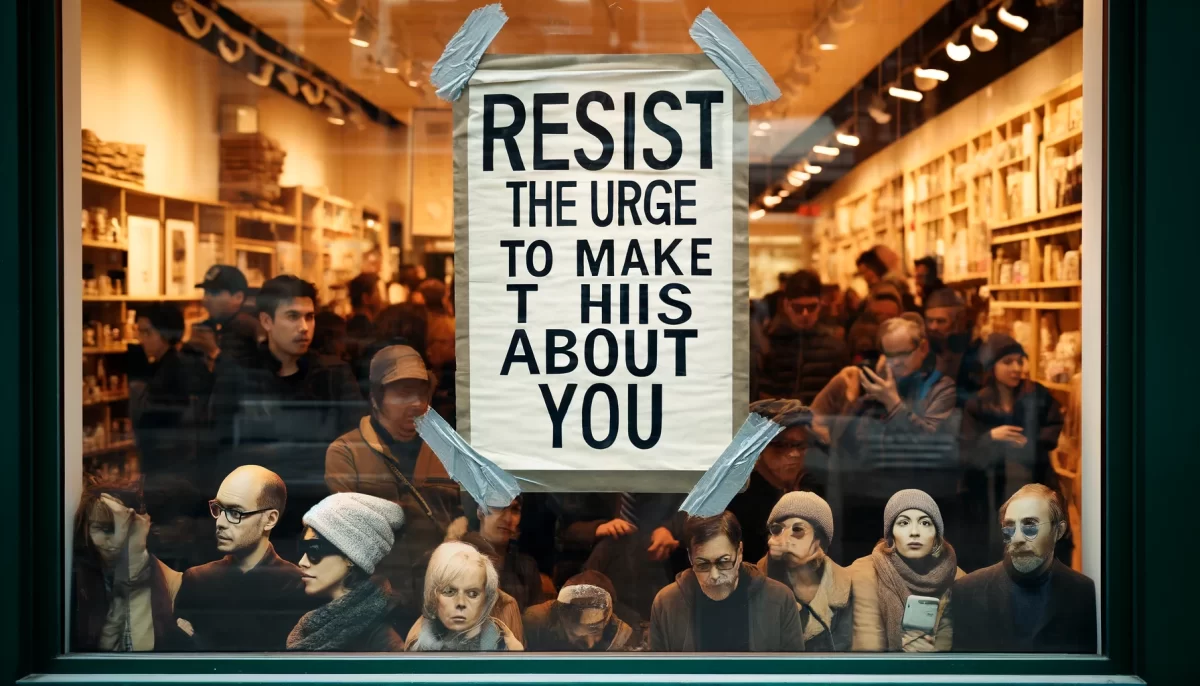




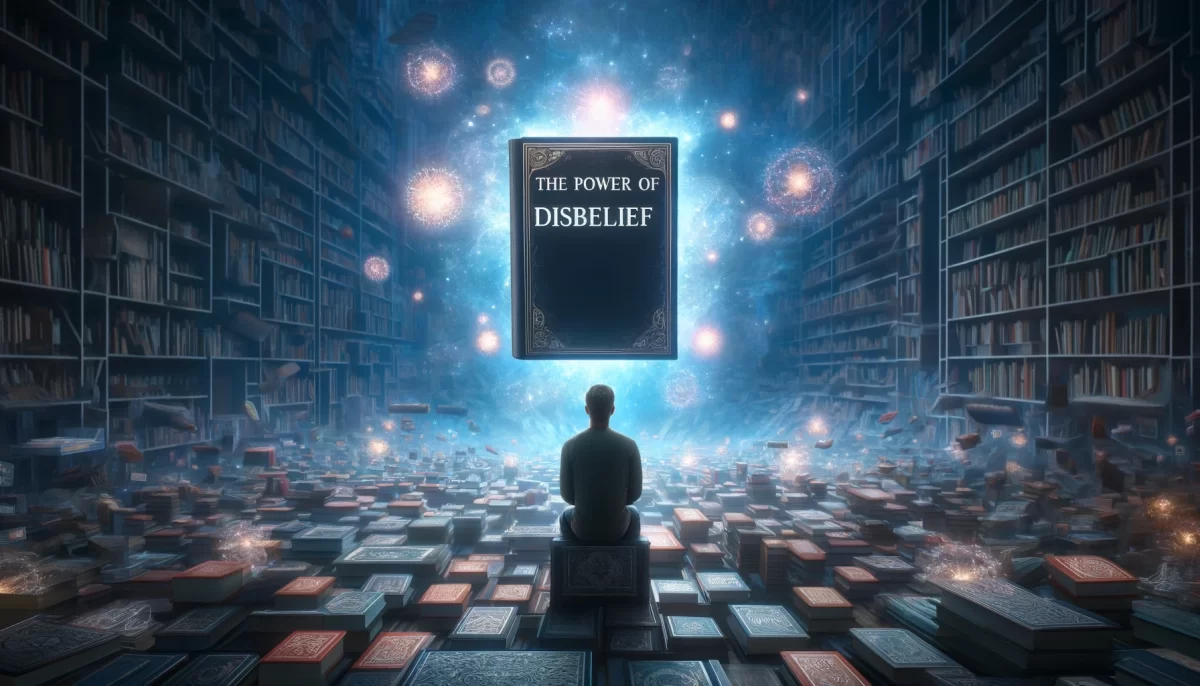


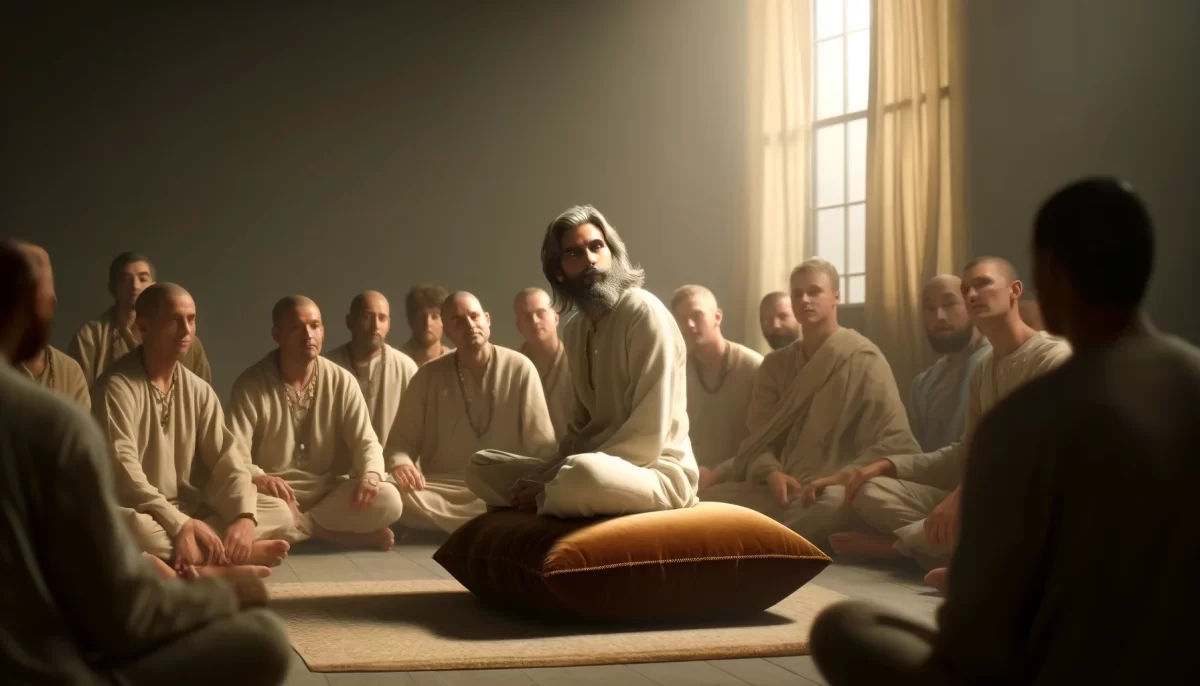




Leave a Reply